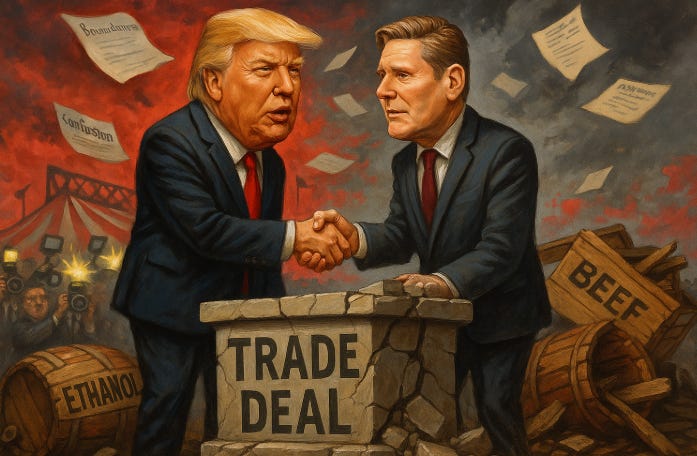A Fake Trade "Deal": The Trump-Starmer U.S.-U.K. Near-Nothingburger, & the Shadow of the Chaos Monkey
A nearly hollow handshake cloaked in media spin…
What we have here is less an economic accord than a theatrical stunt. It changes very little on the actual ground—some beef here, a tariff off ethanol there. The broader signal it sends is one of instability and caprice. With Trump, exporting to the U.S. becomes a risky gamble. The real cost to the U.S. flows from Trump’s blowing-up of all rational belief and trust in the stability of U.S. trade policy. Looking at Trump the chaos-monkey in broad perspective, American producers suffer a widespread loss in global market access, while British producers’ losses remain mostly confined to the U.S. This asymmetry makes the deal a serious strategic own goal for the United States, diluting its trade reliability while gaining little in return. For Trump, though, the deal serves its purpose: a video-ready spectacle for his base. For Starmer, it’s damage control—harm was done, but less than it could have been.
Robert Armstrong this AM:
Robert Armstrong: Unhedged <[ep.ft.com/permalink...](https://ep.ft.com/permalink/emails/…)>: ‘The US and UK struck the first Trump-era trade deal yesterday. It was underwhelming. In return for more buying of US farm goods and removing a tariff on US ethanol, the UK will be exempted from metal levies, and will enjoy lower tariffs on (a few) cars. Other promises and frameworks were laid out, without any timelines…
Relative to the pre-Trump normal, the only steps to increase U.S. market access the U.K. has taken has been to pledge to remove its 19% tariff on U.S. ethanol imports, and allow tariff-free imports of hormone-free beef in the amount of 13,000 tons. All else is hot air: pledges to negotiate additional improvements in market access. Those are as close to nothingburgers as anything could be.
Relative to the pre-Trump normal, the U.K. has less access to the U.S. market than it had before.
Dwarfing this micro-“deal” is a far more important shift in the incentives for U.S.-U.K. trade.
Everyone in Britain now knows that any exports they make to the United States might be disrupted at any time for no reason other than that Donald Trump is a chaos monkey.
Everyone in Britain now knows that exports they make to other countries will not be disturbed.
Thus deciding to try to export to the United States carries huge risks, with associated costs.
And everyone in the U.S. knows that any exports they make to the U.K. might be disrupted at any time as the U.K. retaliates to tariffs and quotas imposed on its exports for no reason other than that Donald Trump is a chaos monkey.
And everyone in the U.S. knows that the same is true of any exports they make to any other country.
Thus, as a result of Trump, U.S. producers have on net suffered a major loss of market access not just to the U.K. but to every single country in the world. U.K. producers, however, have suffered on net a major loss of market access to the U.S., but their ability to export elsewhere remains the same. U.K. producers have lost a little with respect to their ability to fit into productive niches in the highly productive global division of labor. U.S. producers have lost a lot.
Thus taken as a whole—the process and the outcome—this Starmer-Trump fake trade “deal” is a substantial own goal for the United States. It is also a substantial own goal for Trump, at least if you see Trump as an advocate for U.S. exporters. It is, however a win for Trump considered as a videoclip-seeking attention hound.
Taken as a whole this Starmer-Trump fake trade “deal” is a harm-reduction exercise by Starmer that has been largely successful. Yes, harm remains. But it has been substantially reduced vis-à-vis Trump’s initial threats.
In addition to being a win for Trump as a video clip-seeking attention, the process and the outcome together make up a win for journalists who want to gain reputations for being friendly publicists for Trump. Even Robert Armstrong knuckles under, by making sure that the descriptive adjective “underwhelming” is in neither his headline nor his first sentence.

